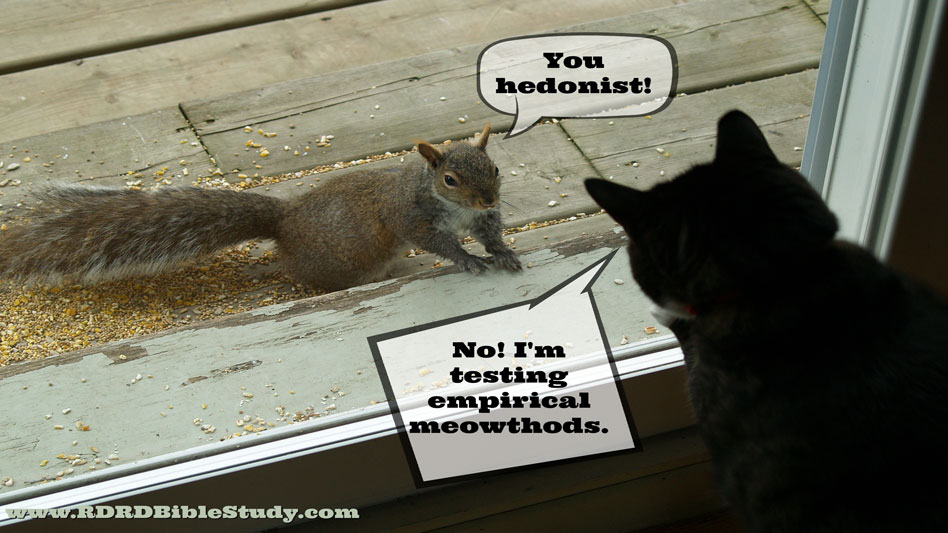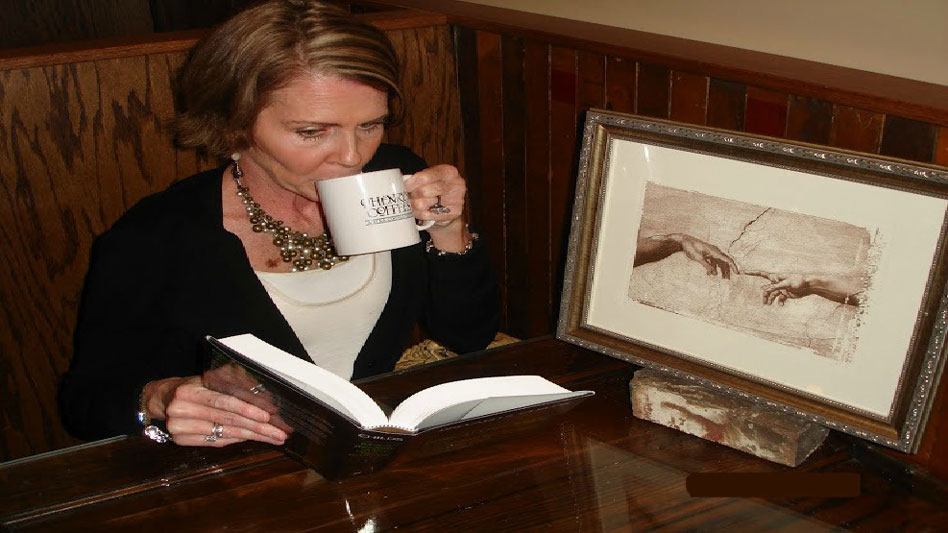Some moments in life are so rare that the details must be chronicled in historical record. Wednesday morning, approximately 9:30 a.m., I sauntered into the quaint Brookwood coffee shop O’Henry’s. Self-indulging with a warmed cinnamon roll, a freshly brewed cup of coffee, reading Brevard Child’s “Law and Gospel” in Biblical Theology of the Old and New Testaments, the thought hit me, “Did I die and go to heaven?”
Obviously, yes!
I sat there basking in the glow of one of those rare moments in life known as total contentment.
Maybe this small event doesn’t seem like that big of a deal. After all, some people experience these moments as often as the rising and setting of the sun. For me, however, these rarities are about as frequent as Haley’s Comet. Even my cat Pipsqueak enjoys astronomical periods of satisfaction on a daily basis—a nap on his perch, spying on a squirrel, eating the same ole Kitten Kaboodle. In Pipsqueak’s world, discontent is the rarefied thing.
Noted, Pipsqueak doesn’t have to work or pay bills, but still I wonder how he imbibes himself on total contentment and I, entrusted with the image of God, don’t/can’t/am unwilling?Christ came so that I may have life and have it abundantly (John 10:10), that with confidence, I can draw near to the throne of grace (Heb. 4:16), and so that the whole of my humanness prepares me for an eternal weight of glory beyond all comparison (2 Cor. 4:17).
I try, and even pray, for this elusive state. So I wonder, is Pipsqueak the epitome of empiricism? Have I crossbred faith and culture to such an extent that my idea of contentment has become some mutated Christian hedonism?
During a quest for answers, I came across an article on Ecclesiastes’ examination of the futility of success. The article indicates that I am not alone in the crusade for contentment:
The urge to get and to have is inherently unsatisfiable, and the tragedy of our society is that it knows this and actually makes it the principle of economic life. A great deal of advertising aims to associate its product with images of ultimately satisfied desire: Buy this and you will be happy; buy this and you’ll have the beautiful girl, the wonderful house, the admiration of your friends and colleagues, and so on. At the same time advertising must feed on dissatisfaction, constantly stimulating desire, promising that elusive something you still have not found. (1)
Luxury cars and big houses do not constitute my “elusive somethings.” But I have “somethings” nonetheless. And the O’Henry’s experience elucidated some major dissatisfactions.
Wednesday morning at a coffee shop is a glimpse of my perceived perfect life, that is, a casual morning doing what my heart loves to do, away from the weekday corporate job doing what my heart does not love to do. A cinnamon roll runs counter to the need to exercise and count calories, and a cup of expensive coffee one ups my disdain of budgets and limitations. And the book symbolizes my insatiable love of biblical and theological academia, almost to the exclusion of anything else.
On the surface, these desires don’t seem all that bad, but neither do most icebergs. The sinking feeling flooded over me of how far off the narrow path of Biblical contentment I had wandered. And that was the good news. The bad news involved failing to notice the red flags. I had been caught in the undercurrents of the wide way of dissatisfaction.
While traversing this wide way, how does one do an about face and travail the narrow way? I do not practice praying to saints, but sometimes I want to cry out anyway, “Paul! How in the world did you find contentment in all things? Please elaborate and quit making things hard to understand, just like Peter, under inspiration of the Holy Spirit, said you do!” Philippians 4:9-13 says:
What you have learned and received and heard and seen in me- practice these things, and the God of peace will be with you. 10 I rejoiced in the Lord greatly that now at length you have revived your concern for me. You were indeed concerned for me, but you had no opportunity. 11 Not that I am speaking of being in need, for I have learned in whatever situation I am to be content. 12 I know how to be brought low, and I know how to abound. In any and every circumstance, I have learned the secret of facing plenty and hunger, abundance and need. 13 I can do all things through him who strengthens me.
In the English translation, “learned” appears three times:
- v.9 “What you have learned… practice these things…
- v.11 “…I have learned…to be content
- v.12 “I have learned the secret”
At first glance, this suggests contentment to be an intellectual pursuit. But each “learned” has a different meaning.
Paul has instructed this church, so they have “learned” from him (v.9). On the other hand, he has “learned” to be content through experience and practice (v.11). He tells them to practice what they have “learned”, so they will “learn” contentment through experience.
“Learned” in verse 12, however, comes from a different verb which translates the phrase “learned the secret.” In the original this means “to initiate into the mysteries.” In Pauline theology, a secret to something unknown, a mystery, is something that only God can reveal (Rom. 16:25, Eph. 1:9, 3:3-4, Col. 1:26-27, cf. Daniel 2:27-30). Paul, through experience and practice, has learned to be content. But the real secret of being content, of knowing how to face extremes and in-betweens, has been revealed to him by the Divine Revealer Himself.
“Okay, Paul? But work with me. Give me something practical.” Philippians indicates that God will reveal the secret of contentment when a person practices contentment. So, which is it? Does God reveal it or does it come by practice?
Acts 26:20 presents a similar dilemma, “declare [to the people] that they should repent and turn to God, performing deeds in keeping with their repentance.” (2) Only the Holy Spirit grants godly sorrow that leads to repentance, but still, according to Scripture, we should practice deeds of repentance.
Both Acts 26:20 and the Philippians passage represent the age old tension and debate between divine sovereignty and human responsibility. But, does this tension have to be an either/or? Can it be a both/and or an either by itself?
God unties this Gordian knot in Jeremiah 29:13: “You will seek me and find me. When you seek me with all your heart.” Divine sovereignty acknowledges human sincerity. Through genuine practice, God will divinely enable contentment whatever the job, weight, or limitation.
“Okay Paul. I think I’ve got it, but aren’t you forgetting something? The secret?!” As if his thoughts had taken him back to the third heavens and then suddenly he has this extraordinary realization, Paul ends this passage with one of the most powerful exclamation points in Holy Scripture: “I can do all things through Christ who strengthens me” (v. 13).
Christ strengthens. Ahhh, the secret, this is.
“Strengthen” here means “to cause one to be able to function or do something.” Christ is the force behind Paul’s ability to function in any circumstance, or do something, like being content, whatever the situation. Paul uses this verb elsewhere (emphasis mine):
But the Lord stood by me and strengthened me, so that through me the message might be fully proclaimed and all the Gentiles might hear it. So I was rescued from the lion’s mouth. 2 Timothy 4:17
I thank him who has given me strength, Christ Jesus our Lord, because he judged me faithful, appointing me to his service. 1 Timothy 2:12
Before a lion’s mouth or delighting in the love and forgiveness of Christ, from one extreme to another, Paul has learned the secret.
God’s little creature.
Does all of this imply that Pipsqueak’s empirical method works after all? Or is there more to it? Can the knowledge of contentment be gained through experience, and then all of a sudden God blesses it so that we are content in all things—spying on a squirrel, taking a nap, wasting away at a meaningless job?
Or does Pipsqueak, a creature of God, delight purely in his Creator and His Creation? Personal opinions aside regarding cats, isn’t this God’s ideal for humanity?
Isn’t the main point of Philippians 4:9-13 that contentment is not the end, but only a means to the end? Christ gives us the revelation of the secret when we practice contentment, not for contentment’s sake, but in order to be drawn into a deeper relationship with Him, a place of understanding that we absolutely can do all things through Him.
Paul’s contentment in all situations derives solely from Christ. The apostle doesn’t enjoy weaknesses, persecutions, hardships, and shipwrecks, but for Christ’s sake, for the sake of proclaiming the Gospel, Paul is content. Why? Because in the apostle’s weakness, Christ’s power rests on him and he becomes a living witness of Christ’s strength made perfect (2 Cor. 12:9-10). And Christ’s grace is sufficient to proclaim the power of the cross to the most obdurate hearts, in the most oppressive situations, the most obvious being our own hearts and situations.
That my O’Henry’s experience involved reading a chapter on “Law and Gospel” is quite ironic. Is the trajectory of the OT Law into post-exilic times so intriguing that I missed the Gospel part entirely? When Law and Gospel stand together, how can a Christian, having the knowledge of the mystery of the Gospel revealed in Christ Jesus, miss the secret of contentment?
For Christ’s sake! The Philippians passage basically says just this thing.
For Christ’s sake, through Christ, His power rests on us and we can do all things—even be content in all things. Christ marks the end, nothing further exists. The Lord of Lords and Kings of Kings is the Satisfaction of Satisfactions and the Desire of Desires.
My mutated form of contentment disillusioned me into longing after pods of secular satisfaction to provide spiritual sustenance. And all the while, a loving and compassionate Father urged me back on the narrow way leading home, longing to embrace me in His perfect will—Christ, the heart’s only contentment.
Caffeine, a good book, and chillin’ at O’Henry’s coffee shop, surely this is heaven on earth.
Until next time—
The grace of the Lord Jesus Christ and the love of God and the fellowship of the Holy Spirit be with you all. 2 Corinthians 13:14
1 Richard Bauckham and Trevor Hart, Finding God in the Mist of Life (Paternoster: London, 2006), 86.
2 “performing deeds” in Acts 26:20 is from the same Greek word used for “practice” in Philippians 4:9.












